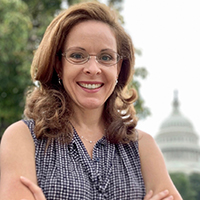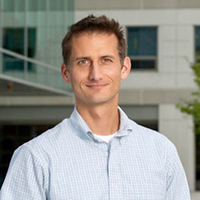In This Story
What exactly is political science? Is it science, politics, or both?
Many of the faculty members of the Schar School of Policy and Government at George Mason University specialize in political science, study political science, and teach political science. The Schar School offers bachelor, masters, and doctoral degree programs in political science.
But if we were to explain this field of study to the layperson, how would we begin to define political science? To answer that question, and many more, we sat down with four of our political science professors to give us some insight into what it is they do: What they teach, research, and write about.

What Is Political Science? Easy, It’s Science!
Former political science program director Jennifer N. Victor, an associate professor, has a straightforward definition: “Political science is the study of politics and government using the tools of social science.” In a sense, she explained, political science uses the same scientific method—question, theory, hypothesis, gather data, test, and conclude—that natural scientists use. However, political science studies people and the institutions, as opposed to natural science, which studies nature.
“The main subfields in political science include American politics, comparative politics, international relations, and political theory,” Victor said. “Each of these subfields has a rich literature of findings and ideas that have contributed to our broad understanding of what it takes for humans to build collective systems to live together.”
In other words, political science is really about what it takes for us to live together.

What Is Political Science? Predicting Phenomena.
Solving problems is a major piece of the political science question. As Associate Professor Jeremy Mayer puts it: “Political science attempts to describe, explain, and predict political phenomena.” And, to add to Victor’s point, there are many more subfields within political science, including political theory or philosophy, comparative politics, international relations, and others. Political science also includes the study of the mass of citizens as well as the elite who make decisions.
Associate Professor Mariely López-Santana, another political scientist, would also include the subfield of international relations—an area of political science concerned with relations across countries. “The field of comparative politics examines the internal politics and institutions of these countries,” she said.

Why Take Political Science in College?
What can signing up for a political science course in college do for you? “At the most basic level,” López-Santana explained, “political science courses will allow you to grasp and assess [with an informed eye] the political world that surrounds us. Beyond that, a degree in political science opens the door to many career opportunities, including a law degree, working in the profit and not-for-profits sectors, becoming a policy-maker, a politician, and/or an academic.”
López-Santana, director of Schar School’s master’s program in political science and the PhD in political science programs, explains her role in the political science field: “As a scholar of comparative politics, I want students to understand that realities are not absolute—there are many political contexts and these are as legitimate as ours. I seek to give students the tools to open their eyes to alternate realities, and explore and comprehend the world that surrounds us.”
Associate Professor Robert McGrath, director of undergraduate programs, explained his view as well for newer students to the field: “To me, politics is all about the inherent conflicts that arise when decisions are made that affect everyone. This includes decisions about who we elect to make decisions on our behalf—presidents, senators, representatives, governors, mayors, city councilors, and others—and the content of their policy decisions themselves.
“Since politics is so consequential, it’s important to understand the process of making these sorts of decisions.”
Indeed, having an understanding of political science can help understand—and guide— these policy decisions.
“That’s what political scientists do,” McGrath said. “We study how aspects of collective decision-making processes can help determine the outcomes.”
“For example,” he continued, “in the U.S., does the process of partisan gerrymandering—drawing boundaries of political districts in biased ways—help protect incumbent legislators and promote partisan polarization? Or, across countries, do political actors elected by proportional representation elections better represent the interests of their constituents than those elected in ‘winner take all’ elections?” Scholars working in the field of political science seek to answer these crucial questions objectively, referencing reliable empirical evidence, he said.

What Is Political Science? A Way to ‘Train the Mind’
“Studying political science helps train the mind in areas of quantitative reasoning and analytical thinking, which are eminently useful skills in many job markets,” McGrath said. “In addition, all citizens practice politics in their lives, either contributing to or consenting with collective decisions. So political science, like the conflict we study as political scientists, is in our human nature.”
While the methods of political science are shared by other sciences, it is really the subject of study which differs. “Where political science differs from other sciences is in our focus,” said Associate Professor Eric McGlinchey. “For instance, my running partner is a chemist. He studies how elements and molecules interact to produce new compounds. Political scientists study how individuals interact to produce new outcomes. We share the same method, the scientific method, but the focus of our investigations differs.”

What Is Political Science? A Sense of Humility
The ambiguity and uncertainty surrounding human nature makes political science complex.
“Problematically for political scientists,” McGlinchey explained, “people are less well-behaved than elements and molecules. Theories are useful in that they allow us to predict the future. But individuals are unpredictable. When two hydrogen atoms and an oxygen atom get together, the result is water. When the U.S. and Russian presidents get together, the outcome often surprises us.” Due to these uncertainties, McGlinchey added, political science demands a greater sense of humility.
“We use the scientific method to develop parsimonious theories,” McGlinchey concluded, “but we must accept that our theories are always incomplete and that human unpredictability, as well as newly uncovered or overlooked variables, will necessitate constant revision and refinement of our causal stories.”
In other words, the work of those within the field of political science is never quiet finished, but that is what makes political science enjoyable: There are always problems in need of solving, and questions in need of answering.
Interested in studying political science as an undergraduate? Start here. Learn more about the Schar School Master’s in Political Science and PhD in Political Science: https://schar.gmu.edu/prospective-students/programs.
